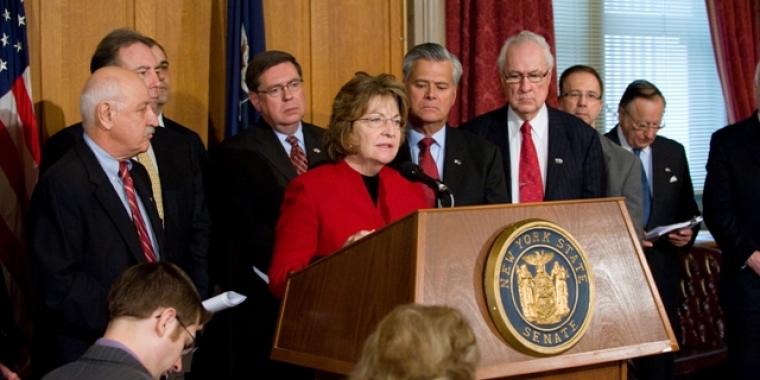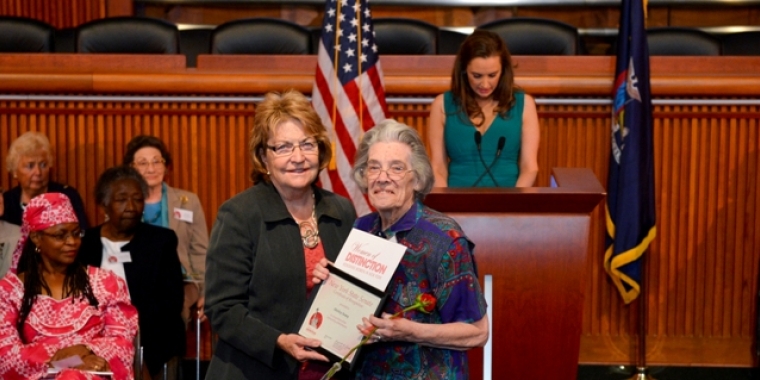
SENATE REPUBLICANS UNVEIL “HOMEOWNER PROTECTION AND PROPERTY TAX REBATE ACT”

Major Tax Cut Initiative Would Provide Property Tax Rebate Check for Every Middle-Class Taxpayer, Cap Property Taxes, Put in Place Mandate Relief;
Usher in Economic Freedom for Taxpayers
Senate Republicans today announced the “Homeowner Protection and Property Tax Rebate Act,” a major new tax cut initiative that would provide a property tax rebate for every middle-class taxpayer. The rebate would reimburse homeowners based on much they pay in property taxes and how much they can afford. The plan also includes a cap on property taxes, along with significant mandate relief to further reduce costs. The comprehensive package would usher in a new era of economic freedom for New York’s taxpayers.
“This new plan provides relief to middle-class taxpayers, many of whom are drowning in high property taxes made even worse by enactment of last year’s all-Democrat state budget. Senate Democrats have talked a lot about property taxes in the last 15 months, but the only thing they have done is to take away the STAR rebate check to pay for additional spending. Our plan provides significant relief to homeowners, especially seniors who desperately need it,” Senate Republican Leader Dean G. Skelos said.
“By giving taxpayers back their STAR rebate check, while also providing a new avenue to address high property taxes related to a homeowner’s inability to pay, Senate Republicans have advanced a strong overall plan to address this problem. If people were able to spend less money on property taxes, they would be able to put more dollars into the economy, which would help create jobs and restore our economic vitality,” Senator Ken Lavalle said.
Under the Senate Republican proposal, homeowners would receive a property tax relief check equal to their 2008 STAR property tax rebate or an amount based on their income through a new property tax relief credit, whichever proves more beneficial.
The STAR rebate would be approximately thirty percent of a homeowner’s current STAR exemption, providing hundreds of dollars or more each year in property tax relief. A new “circuit breaker” tax credit would give back 70 percent of all property taxes paid in excess of 6 percent of household income.
Under the “circuit breaker,” a taxpayer with household income of $50,000, paying $5,000 in property taxes, would receive a $1,400 tax credit. A taxpayer with household income of $90,000, paying $9,000 in taxes, would receive a $2,520 tax credit.
“This legislation is urgently needed to keep New Yorkers in their homes,” said Senator Betty Little. “High property taxes are making it impossible for too many New Yorkers, who spent their lifetime living and working here, to stay. And high property taxes are making it impossible for younger New Yorkers, who want a future here, to be able to afford a home. This bill would provide immediate relief for millions of homeowners with an emphasis on helping those whose taxes far exceed their ability to pay.”
More than 160,000 New Yorkers signed on to a Republican-led petition drive launched last year to restore the STAR school property tax relief check.
Senate Republicans initiated the STAR rebate check program in 2006 and have been at the forefront of efforts to provide tax relief for struggling New Yorkers.
The “Homeowner Protection and Property Tax Rebate Act,” also calls for a permanent ban on all unfunded mandates, along with implementation of new reforms at the State Education Department to keep costs down.
In addition, the plan would reduce paperwork for schools, authorize regional transportation and provide school districts with greater flexibility to purchase from existing contracts held by other government entities.
“Providing property tax relief to the residents of New York must be our state’s number one priority but it is impossible to do that without reigning in school district spending. By banning unfunded mandates and reducing other costly requirements, this act is targeting the number one issue that school administrators say is the cause of their high costs, and that should help lower the burden our taxpayers face,” Senator John Flanagan said.
The plan also includes a proposal to freeze property taxes for seniors age 70 or older to help address the problem of seniors living on fixed incomes who are being taxed out of their homes.
The Republican plan also includes a property tax cap to ensure that school districts do their part to hold the line on spending.
Senate Republicans passed a property tax cap in 2008 in an effort to slam the door on skyrocketing property taxes. The chamber approved legislation (S8736) by a vote of 38-20, following recommendations by the Suozzi Commission on Property Tax Relief and Governor Paterson. The Assembly failed to act.
The plan would be paid for with savings generated from passage of a cap on State spending, which Senate Republicans have long advocated for and approved on two separate occasions when they were in the majority. Senate Republicans said they will include the proposal in negotiations over the Governor’s $135 billion budget. Once public conference committees are established, they will outline other savings in the budget that could be utilized to include the rebate in any adopted budget.
Thus far, Democrats have refused to hold any public negotiating sessions on the budget despite Senate Republicans’ insistence that Senator John Sampson and Assembly Speaker Sheldon Silver agree on a schedule for an open, public budget process -- as required by law -- that leads to adoption of an on-time state budget.
They noted that a spending cap would have saved taxpayers $6.4 billion in last year’s budget and will produce more than enough revenue to provide property tax relief going forward.
Last year’s state budget, passed without a single Republican vote, raised taxes by $8.5 billion, increased spending by $12 billion and eliminated the STAR rebate check. If a single Democrat would have broken ranks with his or her New York City leadership, they could have stopped the budget from being enacted. Instead, they voted in lock step to put in place a budget that raised taxes, devastated small businesses and made the State’s deteriorating economic situation worse.
####



